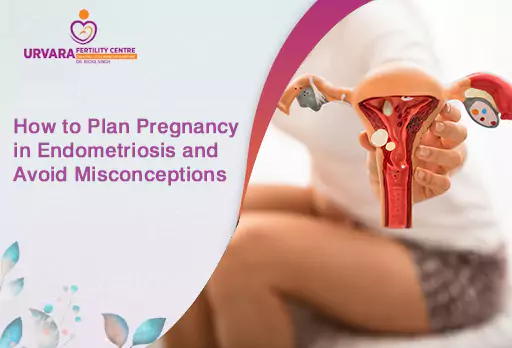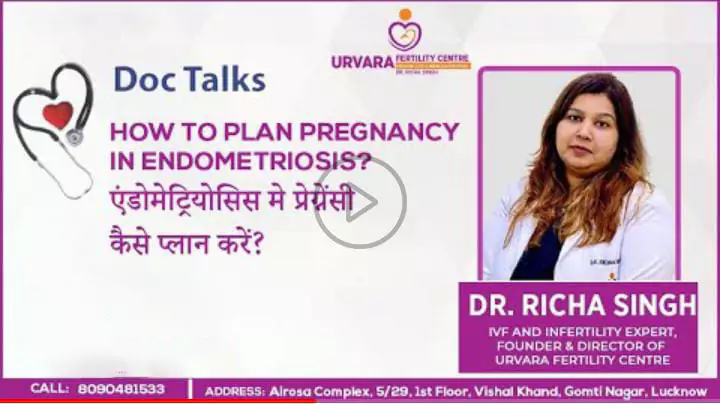How to Plan Pregnancy in Endometriosis and Avoid Misconceptions
When planning a pregnancy, women with endometriosis are often told they will have trouble getting pregnant because the disease has impacted their reproductive organs. The reality is that there are several misconceptions about pregnancy in endometriosis that lead to unnecessary anxiety and frustration.sometimes a lot of women with endometriosis choose not to become pregnant as many misconceptions about the disease lead to a lot of unneeded anxiety amongst women. Here are some common myths and realities about endometriosis and pregnancy, so that one becomes truely aware of the problems and not lose hope.
What is Endometriosis?
It's a condition that causes tissue commonly present in the womb lining to grow in other places - such as the ovaries or fallopian tubes. Each month, these cells react the same way as those in the womb, building up and breaking down and bleeding, but the blood has no place to go. It commonly causes inflammation and pain in your pelvic region, lower back, or stomach that intensifies during your periods.
What does endometriosis mean for fertility?
Unfortunately, this answer is not always clear-cut. Endometriosis doesn't necessarily cause infertility, but it is associated with fertility problems, as with many gynaecological and endocrine (hormonal) conditions that can impact your chances of conceiving, the way that endometriosis impacts fertility can vary greatly from person to person. And, like so many conditions related to women's health, it's complex.
Generally, endometriosis is associated with a slightly longer time to conception, which usually increases with the severity of the endometriosis. It is because increased severity is associated with greater amounts of scar tissue, which causes pain. And the more scar tissue you have, the higher the chance of your egg being trapped in your ovaries or unable to move down the fallopian tube and into your uterus. It's currently estimated that 50% of women with endometriosis can get pregnant spontaneously.
However, that doesn't mean that everyone has to struggle to conceive with an endometriosis diagnosis. Only around 50% of women with endometriosis report difficulty in conceiving. Even women with the most severe condition can still get pregnant and give birth to happy, healthy babies! Research has shown that most women with mild endometriosis have similar fertility rates to women without the condition.
Are there any treatments for endometriosis, and if so, what are they?
Although there is not yet a cure for endometriosis, treatments are often prescribed to slow its progression, relieve pain, improve fertility, and prevent the condition from returning.
Hormonal treatments such as the Combined Oral Contraceptive Pill are often used to ease pain and control symptoms; however, contraceptives won't be your best bet if you're actively trying to conceive.
There are surgical interventions available to alleviate symptoms and possibly improve your chances of getting pregnant - and it typically involves the removal of cysts, adhesions, and nodules formed by the misplaced tissue growth associated with endometriosis.
As with all things related to your health, it's best to consult your healthcare professional on the best route to care when you're trying to manage endometriosis.
What will happen if I have endometriosis and I become pregnant?
Endometriosis is tough to diagnose, so it's very hard to predict if someone will get pregnant or not. However, there are likely differences between women who do and don't get pregnant.
Research shows that for some women, pregnancy temporarily alleviates the symptoms of endometriosis and in some patients when the fetus grows, the stretching of misplaced scar tissue, and the tightness of the tissues around the scar, may worsen and hence the symptoms increase.
Will endometriosis impact my chances of carrying a pregnancy to term?
Endometriosis is usually treated by removing the chocolate cyst in ovary or ablation of endometriotic deposits on outer surface of uterus and ovaries with help of laparoscopy before conception .But once conceived in some patients it poses risk for miscarriages and in some alleviation of all symptoms related to it .There is still a. debate whether complications in the later stage of pregnancy are increased due to endometriosis.
Miscarriage, or spontaneous abortion, is a pregnancy loss that occurs in a woman before the fetus has fully developed. It's most common between 6 and 10 weeks of pregnancy. If you have endometriosis, the odds of miscarriage increase to 1 in 4.But with adequate care and medicinal support the complications can be minimised and this may not be the case for everyone, But if you have a history of endometriosis or a previous miscarriage, one should always consult a doctor during her pregnancy so that any anticipated complications can be avoided.
Are there any other risk factors for pregnancy in patients having endometriosis?
A study suggests that women with endometriosis are 33% more likely to have a premature birth, typically associated with lower birth weight for the baby and a higher incidence of developmental problems
When pregnant with her first child, a woman should always be under medical supervision and with the help of your doctor you will be able to manage this problem throughout your pregnancy and she may assist you with any challenges.
What will happen after I give birth if I have endometriosis?
Although pregnant women tend to experience more painful periods after giving birth, once their body returns to a normal state, symptoms of endometriosis typically return and often are worse than pre-pregnancy.
Breastfeeding can have some interesting effects on your body after you give birth. Studies have shown that breastfeeding helps to lengthen the "remission period" after pregnancy and reduce endometriosis-related pain. It also inhibits the release of estrogen by the ovaries, suppressing ovulation and halting the development of your endometriosis.
How can I take control of an endometriosis diagnosis?
An endometriosis diagnosis can feel like a life sentence, but once you know you have the condition, there are several things you can do to take back control of your body and ease your pain.
Sometimes short-term pain relief methods include using heat pads on your stomach or taking a warm bath when the pain is particularly bad, and some women have found acupuncture helpful with pain relief
Eating a healthier diet, eating more fruits, veggies, lean proteins, and less processed foods might help reduce the frequency and severity of endometriosis symptoms. Exercise can also be helpful.
1. Food and diet
Studies have suggested that avoiding the trans fat in fried, processed, and fast foods and avoiding red meat, gluten, caffeine, and alcohol can help lessen the pain and growth of endometriosis. Instead, here are some foods to love:
- Fibrous foods such as fruit, vegetables, legumes, and whole grains
- Essential fatty acids like salmon, sardines, herring, trout, walnuts, chia, and flax seeds
- Iron-rich foods such as dark leafy greens, broccoli, beans, fortified grains, nuts, and seeds
- Antioxidant-rich foods found in colourful fruits and vegetables, such as oranges, berries, dark chocolate, spinach, and beets
- Consider supplementing your diet with zinc, vitamins A, C, and E - but be sure to talk to your doctor before beginning any supplementation plan, especially if you're pregnant, or breastfeeding.
2. Exercise
We always preach listening to your body above all else! Some women find that high-impact exercises and traditional core routines (like sit-ups and crunches) exacerbate abdominal pain, especially during your period. If you find certain workouts heighten your pain, please skip them.
However, if you feel able to, maintaining a regular exercise routine can help manage endometriosis symptoms, as we also know that regular exercise is proven to:
- Boost your mood
- Ease pain and inflammation
- Reduce stress
- Improve sleep quality
Try yoga and bodyweight exercises that relax, lengthen, and strengthen your pelvic floor, abdominal wall, and hip flexors.
Key takeaway: you can have a healthy, happy pregnancy with endometriosis
Being diagnosed with endometriosis can make your life more complicated and scary because you can't predict what it will do to you and your future fertility.
But, despite the risks we've outlined here, there are countless examples of women with endometriosis who have conceived naturally and given birth to healthy babies.
Some treatments can make you feel better if you have a condition that causes discomfort or pain.
The most important thing to know when you're pregnant or trying to get pregnant is to check in with your doctor and ask for a diagnosis as soon as you feel something hope this helps you plan a pregnancy with endometriosis.

